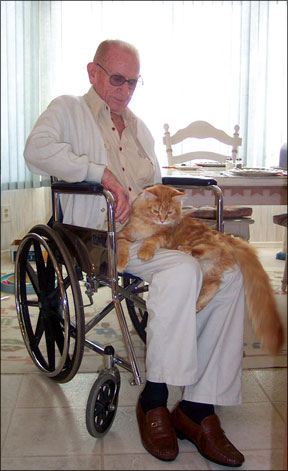Mary Jones has been living in New York City with her housemate Alice for the past ten years. Mary and Alice are actually about the same age. Both want to stay together for as long as they can take care of each other. But Mary is an 80-year-old widow and Alice is an 11-year-old domestic shorthair. Marys eyes arent as good as they used to be, and her arthritis bothers her when she bends over. So she worries how she will keep on cleaning Alices litter box and carrying the heavy bag of cat food up the stairs. And she

288
wonders what will happen to Alice if her beloved companion outlives her.
Weve heard a lot over the past several years about how older people benefit both emotionally and physically from living with pets. The problem is this: As people get older, they often experience disabilities which may prevent them for fully caring for the pets they love. What can older people do?
“We adopt pets out to older people all the time,” says Gail Buchwald, MBA, senior vice-president, overseeing the adoption center of the ASPCA in New York. “We dont turn down adopters based on age. We do have an in-depth discussion as to the responsibilities of caring for a cat and what kind of care the cat will need. In many ways, retired pet owners are ideal because they tend to have plenty of time to spend with their pets.” What can you do to help an elderly relative, friend or neighbor to keep his cat?
The Challenges
Seniors face a number of issues in keeping their cats or dogs. One of the most important concerns is physical disability. Sight may begin to fail, walking or bending may become more difficult and memory may wane at times. The expenses of food, litter and veterinary bills may be overwhelming for a person on a fixed income. Family members may discourage an older person from keeping a cat because they worry the cat could scratch or bite the individual – or just be too much to care for.
Pet ownership does require some mobility, says Buchwald. A person must be willing and able to take responsibility for another life – whether its feeding the cat or changing the litter box. They must also have the mental clarity to remember when the cat was last fed, seems ill or needs to take its medications.”But disability or age should not determine whether or not one can take care of a pet,” says Buchwald. “We see people in wheelchairs walking dogs and homebound people taking good care of their cats.”
The important thing is that when a person becomes frail or disabled, there is help so that the individual can keep her pet.
What You Can Do to Help
How you help an older person and his cat depends on the specific problems the person may be facing and how those problems affect the cats care. Here are some options:
Make simple modifications in the home – “If a person has trouble bending to scoop the litter, elevate the litter box so that the cat can jump in and the cats companion can more easily reach the litter box to clean it,” says Buchwald. You can also make feeding easier by rigging up an elevated feeding station for the cat. As long as the cat can easily reach the higher-level litter box or food bowl, this will work for someone who has back problems or arthritis.
Take Safety Measures – Some older people complain that they cant see their cat at night, and theyre afraid of tripping over them. “The solution here is to have the cat wear a bell on a collar,” says Buchwald.
Pick the Right Cat – If you know an older person who wants a cat, encourage him to adopt an appropriate cat. “Avoid getting kittens and adolescent cats that are usually too high-energy and demanding,” says Buchwald. “For example, this age group is associated with bursts of activity which could result in knocking over things or disrupting the home.” She notes that the pets age and appearance should not be the deciding factor for adoption. “Instead, an adopter should consult with the adoption centers expert to help them select a cat that meets their personality needs.
The cat should definitely be kept indoors. Its safer for the cat and the cats companion because there is a decreased chance of the cat picking up parasites which could harmful to both, says Buchwald. If regular grooming is an issue, an older person might consider adopting a short-haired cat that is easier to keep clean and groomed.
Build a Support System – Arrange for local friends and/or relatives to help an older person care for her cat. Sometimes just checking in to see that everything is alright is sufficient to give a senior the confidence to keep on going. And if there is something wrong with the cat (or person), you can pick it up quickly. You can do a variety of things to help, including changing litter, taking the cat for veterinary visits, buying cat food – or even offering your home to board the cat if the senior companion must go away or has to go into the hospital. An older person should have a call-list of friends, relatives and neighbors who are available to help in case something happens.
“I personally brought in two cats for adoption from a senior citizen who suddenly went to the hospital and, subsequently, passed away,” says Buchwald. Because the building superintendent knew about the situation, he had been going in and feeding the cats while the woman was in hospital. “I found the cats in good physical shape,” says Buchwald. “If that detail had not been attended to, the cats may have been without care.”
“In some cities there are agencies that provide volunteers to check in on people and pets,” says Buchwald. “In New York City, there is a small program called the Jewish Association for Services for the Aged (JASA) Pets Project, which is dedicated to helping older people and their pets stay together.” Call your local humane society or citys elderly services to see if there is a similar program.
Older people need their pets – their cats – that have been lifelong companions, in many cases. But older individuals might need help caring for them. If we volunteer to assist them or arrange for services, cats and their companions will be able to stay together much longer. And elderly people have something they can offer their cat – unlike many of their younger, busier peers can. And that is … the time and extra attention that cats crave.



